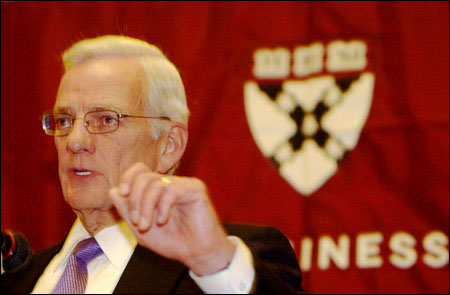Treasury secretary talks values at HBS:
Workplace safety embodies corporate values, leadership

To U.S. Secretary of the Treasury Paul O’Neill, there’s no better way to demonstrate corporate values and leadership than by keeping your employees safe.
Speaking at the Harvard Business School Thursday (Oct. 17) as part of the School’s Leadership and Values Initiative, O’Neill drew on his pre-Treasury experience as chairman and CEO of Alcoa, the aluminum manufacturer whose workplace injury rate plummeted under O’Neill’s direction.
“I care about safety because I think it is a direct, tangible way to connect with human beings on a nondebatable goal that is truly important to every human being,” O’Neill said. Human beings, he said, were at the core of his definition of values.
Directing the audience to his prepared remarks on the Treasury Web site, O’Neill was casual yet focused in his off-the-cuff remarks about values and leadership in the workplace. Surprising to some, he gave little attention to his role as Secretary of the Treasury or current headline-grabbing issues in corporate governance, speaking instead about his personal philosophy and application of leadership values.
“I’m not going to talk to you about politics today,” he said. “I’m going to talk to you about life.”
He went on to outline his personal trilogy of values-based leadership: treating employees with dignity and respect; giving them the knowledge, tools, and support they need to make a meaningful contribution to the company; and recognizing the contribution of all employees.
Most of the HBS students in the audience, which also included students from the Kennedy School of Government, had looked at Alcoa’s workplace safety efforts in a case study. During O’Neill’s tenure at Alcoa, from 1987 to 2000, the manufacturer reduced its workplace injury rate – already lower than the national average – by 90 percent.
That alone is no mean feat for an industry that deals in 2,000-degree metal, but Alcoa accompanied its safety gains by profit, increasing its value to shareholders eightfold.
Yet O’Neill’s zero-tolerance for any “incidents and accidents” blemishes on Alcoa’s safety record was motivated by values – respect for employees and their health and safety – not profit, he insisted.
“I went to Alcoa with a burning fire … to demonstrate that it is possible for a truly great organization to be value-based without any reservations,” he said. To avoid a perception that his focus on safety was anything other than a values issue, he threatened to fire managers who brought him an analysis of how improved safety was bettering the bottom line.
“It was the beginning of a determined effort to systematically work with people … to prove to them that there should never be a trade-off between values and economics. Values should always win,” he said.
Fielding questions for as long as he spoke, O’Neill amplified his core message with examples from his experience, speaking about private versus government-sector leadership and being ethical versus appearing ethical. He sidestepped one student’s question about the role of Treasury secretaries on the economic boom of the 1990s and the current recession, speaking instead about his work to reduce the accident rate at the U.S. Treasury.
Values are a global concept, he told one student, and there is no fundamental difference between corporate or human values in first- or third-world nations.
O’Neill assured the students in the audience that the world eagerly awaits their leadership.
“The world is desperate for the application of what you’re learning here,” he said. “Not only do you have the talent and the tools, you have the obligation.”




